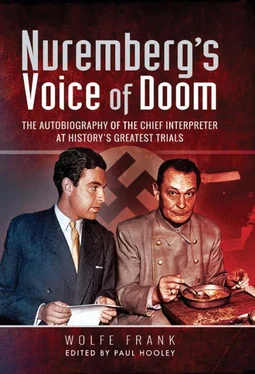Predictably, he succeeded. I got a dressing-down when Turrell returned which included the moot question of what would happen if everybody were to act like me, there being a war on. My in-born tact prevented me from enlightening the colonel to the fact that there wasn’t a war, not anymore, except between him and me. Our mutual dislike for each other was blatant from the first moment we met and it survived until he went home to be de-mobbed. Hardly anybody liked Turrell. He was out of his depth among our lot. There were ex PoWs, including some real heroes, like Airey Neave, [3] Airey Middleton Neave (1916-1979) was the first British officer to successfully escape from the prisoner-of-war camp at Colditz Castle and later worked for MI9. A well-qualified lawyer, he spoke fluent German and at the IMT in Nuremberg he read the indictments to the Nazi war criminals on trial and was an investigator for the Krupp trial. He was elected MP for Abingdon in 1953 and was assassinated in March 1979 when an IRA bomb was exploded under his car as he drove out of the Palace of Westminster car park.
intelligence agents, historians, language teachers and writers and we were all very much through with ‘soldiering’ as Hugh Turrell knew it. (The situation is best summed up by his departure. He had given a party and, sadly, only a few of us had been able to attend. He walked up to me and another officer to bid us farewell. ‘Goodbye, Sir,’ I forced myself to say, successfully supressing the ‘good luck’ part of it. ‘Goodbye, Sir,’ said my companion, Captain Peter Fraser, ‘it’s nice to see you go’).
I could see as I left Turrell’s office after having been castigated that barring a miracle, my staff captain’s rank was now safe forever – in other words, I didn’t need to worry about promotion. I didn’t try, and I didn’t get it.
Turrell had no say regarding our assignments, our offices or our duty hours. The military nonsense was being performed by non-specialists among the officers and men, and the few occasions when we acted like soldiers involved the running of our billets – villas in a suburb of Nuremberg – drawing rations, being carried in Army vehicles, applying for leave and picking up the paycheque. The latter item was somewhat undersized compared to what our American hosts were hauling down. I discovered, for instance, that my pay including extras was considerably less than that of an American sergeant!

27. THE NUREMBERG SCENE
ONCE AT NUREMBERG WE WERE HOUSED and fed by the US Army, on rations that made our British Army fare look like a starvation diet. We had our liquor allowance, which was substantial, we drank in the US officers’ clubs for very little money, and we could not, of course, spend money on the German economy – firstly because this was strictly ‘ verboten ’ and, secondly, because there was nothing to buy. There was however a lot to be traded and our American hosts, outside the trial staff, were deeply involved in these activities from the word go. Anyone involved in the trial was under such strict orders to keep away from the Germans that obedience was only one option, at least for a while.
The degree to which the rules were broken, as time went on, depended on the individual. As a rule of thumb, I would say that in the British contingent fat slob Wormser broke none and I broke the lot. We will come to that in due course.
I was assigned accommodation, a share in a batman and a desk in an office where Leslie Hill and I were to crank out translations. The Justizpalast (Palace of Justice) was buzzing with excitement, rumours and guesses as to when the trial would start. I obviously wanted to see the show. So did everybody else. Inevitably, it became apparent that only a miracle would get us into the courtroom that would have, we were told, only thirty to fifty seats for spectators. Clearly, we couldn’t expect to see the show unless we were doing a job involving our presence in court – and translators were not involved. But for me the miracle happened. I owed it to the same voluminous personal history form that had made me the most successful machine-gun instructor in French, of my regiment, the Northumberland Fusiliers. Here is what occurred.
Enter full Colonel, United States Army, chest covered in impressive fruit salad (medals). Colonel casts approving glance upon virginal note pad on Frank’s desk, winces at Hill’s un-interrupted, frenzied activity. Obviously familiar with British badges of rank, he casts a glance at Frank’s three ‘pips’ and beckons him to follow. Outside office, he introduces himself:
‘I am Colonel Dostert.’ [1] Colonel Leon Dostert (1904-1971) was a French born American scholar of languages who introduced Simultaneous Interpretation to the world at the Nuremberg Trials where he was Head of the US Language Division.
This was said in English with a thick, French accent, ‘and I am in charge of the language division here for the US Army. Come to my office weeese me, please.’
I hadn’t a clue what this was all about. We pushed through a dense crowd of very busy people in an anteroom, some of them snapping to the American version of attention. I noticed that the office had a carpet. I was mixing with the haute-volee (VIPs), obviously – and then I saw it: Army Form (questionnaire) 17X49B/31 (94), dated sometime in 1940, truthfully completed by me. ‘Wherever, Sir, did you get THAT?’ I gasped. He then explained:
Dostert was President Eisenhower’s English/French interpreter and a good friend. When ‘Ike’ had first become aware of the plans for bringing the top Nazis to trial he had tried to picture how the language problem could be solved. He had, understandably, had moments of irritation in the face of consecutive interpretations, in his activities as top commander.
‘Surely, Leon,’ the conversation between Ike and Dostert had run, ‘this means if a guy says something in German, some other guy has to translate it into English?’
‘Yes, General, and somebody else has to translate it into French, and somebody else into Russian… and if a guy says something in Russian that has to be translated into English, and into French, and into German.’
The Supreme Commander of Allied Forces was pacing the floor.
‘Holy Mackerel, Leon,’ he commanded ‘You gotta do something.’
And simultaneous interpretation was born.
Dostert had taught languages at the University of New York. His mind had always been preoccupied with the subject of simultaneous interpretation. We will shortly hear what it involves. Heretofore in every sphere of life – diplomacy, industry, science and all other areas, interpretation had always been done consecutively. There had been attempts at the League of Nations, to accelerate these translations by doing them all at the same time via the required number of channels after the orator had finished, but nothing had come of it.
Leon Dostert had always wanted to create a system whereby the words of a speaker would be translated into another language as they were being spoken. However, the opportunity and the means were lacking – now, here it was. He had Ike’s support, he would do it, and he did.
He sat in on the negotiations to set up the trial of the major war criminals. When the statesmen, the jurists, the historians and the military had had their say he raised his point as follows:
‘If the trials were to hold water,’ he said, ‘it would be necessary that anything said in one language would have to be translated, verbatim, into the other languages used in the courtroom; English, French, Russian and German. This meant three repetitions, in three languages, of every sentence spoken during the trial. It meant that every written statement, every written exhibit, every written plea would have to be translated beforehand and read into the record, in court, in the other three languages. It meant also that every question addressed to a witness in direct or cross-examination would have to be translated first into his or her language, and then into the other two for the benefit of counsel, the tribunal and the defendants. Further,’ he said, ‘cross-examinations would lose their impact if questions were asked in a language which the witness understood, because he would have the right to hear the question in his mother tongue, a disastrous handicap for prosecution and defence alike. Every reaction in that courtroom would be delayed by a time factor of three times the original statement. It also meant that the trial would last three times as long, cost three times as much and that, to put it in simple terms, it would fall flat. There may also be many auxiliary effects, such as people dying, including defendants, or returning home (not including defendants) and many, many more.’
Читать дальше













